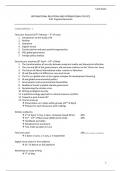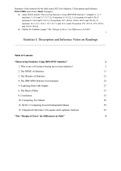Notes de cours
International relations 2 all notes
- Cours
- International Relations
- Établissement
- Katholieke Universiteit Leuven (KU Leuven)
These are all class notes in one complete, comprehensive document, in a clear and cohesive lay-out. This contains pretty much all you need to study for your exam, leading you to save time during lectures (only additional personal notes needed) and helping you see the structures within the subje...
[Montrer plus]





